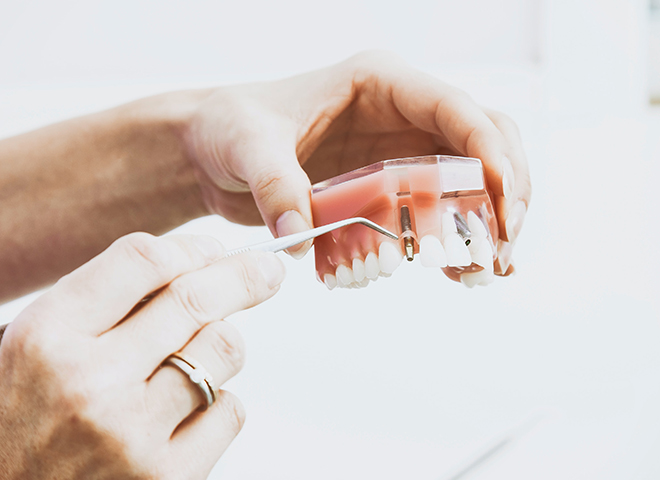What should i expect after dental implant treatment?
Many patients are surprised at how easy dental implant insertion can be and how little discomfort they feel afterward. Technological advances and thorough and accurate preparation in advance mean that implant placement is a relatively simple minor surgical procedure. Most of the evaluation and planning takes place in advance.
For the implant procedure, your dentist will do a comprehensive examination of your mouth. This will include taking radiographs (X-rays) and sometimes CT scans to evaluate the shape and condition of your bone. This allows the dentist to plan exactly how and where implants will be placed during your treatment.
Once you decide that dental implants are right for you, your main focus may be on the day the implant procedure takes place. However, it's also a good idea to consider the immediate and long-term care of your new teeth.
After treatment, it will also be your responsibility to practice good oral hygiene every day for the optimum health of your implants. As with natural teeth, keeping your implants, teeth, and mouth healthy is essential to avoid problems. If you take good care of your implants and the bone they are attached to is strong and healthy, you can be sure that it will last for many years.
Immediately after the treatment, your dentist will give you instructions on how to take care of your mouth. It will be very useful for you to give brief information about what you can do before and after the treatment.
Before your treatment
Will I need time off from work?
You are unlikely to take time off from work, but as a precaution you may want to schedule a day or two off. It would be good if you be careful not to plan any major social or work events for a few days after treatment.
Do I need someone to accompany me?
It is recommended that you ask someone else to drive you home the day you place your implants. Implant dentists usually use local anesthesia, but they may recommend sedation if you wish. This can be given orally or intravenously. If you opt for sedation then a responsible adult may need to accompany you to your appointment. If you choose sedation, your dentist will give you more advice.
Will I need painkillers?
You may not need any pain relievers, but keep in stock suitable pain relievers for the post-procedure, just in case. If you are allergic to any medication, please discuss this with your dentist.
You can contact us for more detailed information.
After your treatment
Will my mouth bleed?
Some minor bleeding is normal after the dental implant is placed. Your dentist may ask you to firmly bite a gauze pad for an hour and apply pressure to the area. The pad should then be gently removed.
After the implant is placed, you will experience much less bleeding compared to tooth extraction because the implant is placed in the cavity. There is no clear zone to heal.
How can I speed up recovery?
Avoid rinsing your mouth after implant treatment and try not to disturb the surgical site with your tongue or fingers for the rest of the day. This can dislodge the formed blood clot, causing bleeding. Do not spit, use straws or smoke.
Should I rest later?
Since heavy physical exertion can cause pain and encourage bleeding, it is useful to limit your activities on the day of surgery.
When should i take pain relief?
You probably won't feel any discomfort after having dental implants. Your dentist may recommend that you take your first dose of pain reliever before the anesthetic effect wears off, and then take them regularly at the maximum dose specified for the first two days after you.

